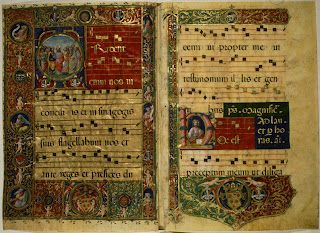At the same time
we worry about our old pianists it is a good idea to keep tabs on the younger ones, the musicians who, God willing, will be among us for a long time.
With which, I checked in to see how Stephen Hough is doing.
It has been too long since we got to look in on
Stephen Hough's Web log in the Telegraph. I love it but my life is in such terrible disarray that I do not check it as often as I would like. Especially if you are at work, there is nothing like checking Stephen Hough's Web log and there is Hough in his hat, and something interesting he has written, complete with, I don't know, 550 comments.
So, that having been said...
What has Mr. Hough been up to?
Click, click, click....
Ah!
There is an exploration of Debussy and Ravel.
And:
There is "Becoming Jewish and Staying Catholic."
Reminds me, I am not the only Papist in the music biz!
That post is about how the Catholic Church has its roots in Judaism. I have not waded through all the comments but I would love to weigh in, if no one else has, about how going to the Tridentine mass I am reminded every Sunday of this ancient connection. We have the Prayers at the Foot of the Altar, this prayer sequence before Mass. It is one of my favorite parts of the Mass. And the prayers come from the ancient psalms.
"I will go unto the altar of God, to God who gives joy to my youth."
And there is this beautiful line about "Why art thou sad, O my soul, and why dost thou disquiet me?"
This is all in Latin, of course. Well, actually, if you poked your head into the church, you would hear nothing. Everyone is just kneeling there and it is silent. But it is going on all the same. Catholicism, a most mysterious religion!
I love these particular prayers because it reminds you of how far back everything goes, that the events in the Gospels were predicted by the prophets centuries before. That it goes WAY back.
You do not get these reminders in the new Mass in the, ahem, vernacular. The Prayers at the Foot of the Altar were lopped off.
Anyway, I wish I could comment all this, but I cannot because I do not have a Telegraph password and I cannot imagine the red tape involved with trying to work all that out.
And so...
No comment.
No comment, no comment, no comment!




























.jpg)

















